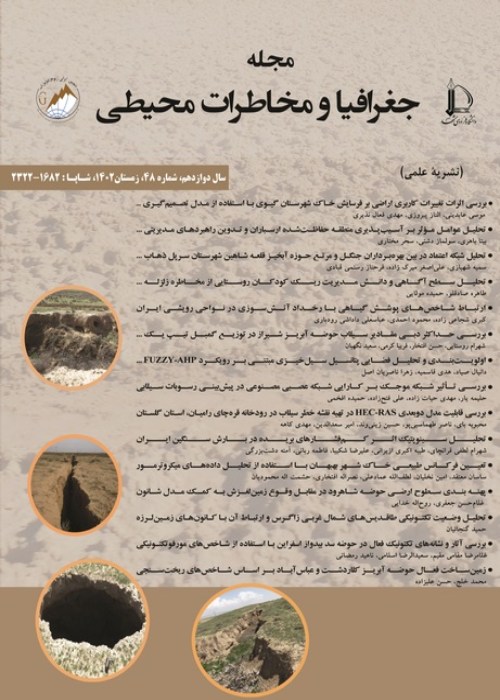Analysis of Sustainable Transportation in Mashhad Using Ecological Footprint
Author(s):
Abstract:
Introduction
The concept of sustainable travel and transport is embedded in the broader concept of sustainable development، which relates to maintaining or improving the quality of human life and variety of social opportunities within the natural constraints and limits of the global ecosystem. The Organization for Economic Cooperation and Development (2004) defines an environmentally sustainable transport system as ‘‘one where transportation does not endanger public health or ecosystems and meets needs for access consistent with use of renewable resources below their rates of regeneration and use of non-renewable resources below the rates of development of renewable substitutesThe main purpose of this paper is assess the ecological resources، for the purposes of transportation within the city of Mashhad in analogy with the biological capacity of the metropolis and providing appropriate sustainability strategies and patterns using ecological footprintStudy Area: Mashhad، Iran''s second largest metropolitan area of 350 square kilometers or 35،000 hectares and a population of 3،009،295 people in 2012، it is estimated According to statistics، daily over Than 800 thousand vehicles traffic in Mashhad and annually about 40 thousand cars to be imported to the urban street network. daily، 4 million 200 thousand Travel within the city and one million and 200 thousand people are displaced. According to statistics، the number of people visiting Mashhad for a day trip has increased from 3893932 in 2005 to 5876313 in 2011 or has growth 33. 7 perecent. Material And Methods
The ecological footprint is an approach that aims to assess the human impact on the environment and represents the load on the environment and nature. This approach has been developed two decades ago by William Rees، a biologist and regional planning at the University of British Columbia، Canada (UBC)، in which the rate of annual needs of a country، a city، a neighborhood، or a family، based on the amount of land or Sea productive (in terms of ecology)، with existing technology is calculated The ecological footprint is divided into five separate categories of items: 1 - Food 2 - Housing، 3 - transportion، 4 - and 5- consumer goods - services. In this paper ecological footprint of transport has been calculated. So Determination of the ecological footprint from the consumption of fossil fuels and ecological nature is also important for Calculation of the absorption and desorption of carbon. Accordingly، each hectare of forest can absorb 100 Gygazhvl energy is equal to 1. 42 tons of carbon dioxide a year. To calculate the ecological footprint of transport an array of different activities That impact on the environment are considered، including carbon dioxide، methane، nitrogen oxides and carbon from fossil fuels and the preserve of vehicles، roads and transport infrastructure. Results And Discussion
The first step to calculate the ecological footprint of transportation in Mashhad، is Calculating the amount of land allocated to each sub-domains of this section. Mobility and transportation devoted 87785616 square meters of land in Mashhad equivalent per 0029/0 hectares. In the second step، each of the forms of energy and fossil fuel consumption in the transport sector consumed in a year is determined by the thermal value of each unit، all the same. Gasoline Among other energy، products more than 24 million Gygazhvl that alone makes up 69% of consumed energy. Holding per capita consumption and the equivalent of the land boom cognitive، ecological footprints of energy will be obtained for Mashhad city residents. Ecological capita fossil fuel per 100 Gygazhvl in one hectare equals 1. 42 tones of carbon dioxide per year.)The amount of ecologically productive land such as forests، which is required to attract all carbon dioxide emissions from fossil fuel use a man(the city''s energy consumption by more than 35 million Gygazhvl year to meet the need for transportation fuel، will produce roughly 497،554 tons of carbon. Energy consumption in the transport sector for every citizen of Mashhad isv11. 17 Gygazhvl equivalent per capita Ecological that for every 100 Gygazhvl on one acre 0. 11 acres for every person. Vast land area backup transportation for the city of Mashhad، north of the border sycamore and has spread south to FreemanConclusion
Calculating the ecological footprint in the transportation field، it became clear that does not exist a balanced and rational relationship between the environment and support local biodiversity and the capacity of the city of Mashhad. The results show that energy consumption in the transport sector for every citizen of Mashhad 11. 17 Gygazhvl and its ecological equivalent per hectare per 100 Gygazhvl in a 11/0 acres for every person. so Mashhad population demand of 359،342 hectares، to eliminating their transportation needs. To achieve the goals of sustainable development، improve the investment climate in the energy sector and development of energy infrastructure، improve energy efficiency and energy saving and diversification of energy sources is essential.Keywords:
Language:
Persian
Published:
Journal of Geography and Environmental Hazards, Volume:3 Issue: 11, 2014
Pages:
93 to 106
magiran.com/p1375722
دانلود و مطالعه متن این مقاله با یکی از روشهای زیر امکان پذیر است:
اشتراک شخصی
با عضویت و پرداخت آنلاین حق اشتراک یکساله به مبلغ 1,390,000ريال میتوانید 70 عنوان مطلب دانلود کنید!
اشتراک سازمانی
به کتابخانه دانشگاه یا محل کار خود پیشنهاد کنید تا اشتراک سازمانی این پایگاه را برای دسترسی نامحدود همه کاربران به متن مطالب تهیه نمایند!
توجه!
- حق عضویت دریافتی صرف حمایت از نشریات عضو و نگهداری، تکمیل و توسعه مگیران میشود.
- پرداخت حق اشتراک و دانلود مقالات اجازه بازنشر آن در سایر رسانههای چاپی و دیجیتال را به کاربر نمیدهد.
In order to view content subscription is required
Personal subscription
Subscribe magiran.com for 70 € euros via PayPal and download 70 articles during a year.
Organization subscription
Please contact us to subscribe your university or library for unlimited access!


